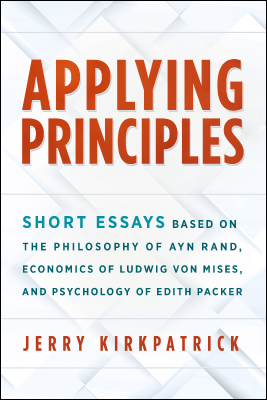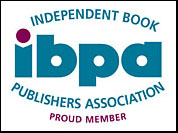Scholarly works in the Objectivist and Austrian Traditions
Preface • Excerpt • Behind the Scenes
 Preface
Preface
Applying Principles:
Short Essays Based on the Philosophy of Ayn Rand, Economics of Ludwig von Mises, and Psychology of Edith Packer
by Jerry Kirkpatrick, Ph.D., Professor emeritus of International Business and Marketing, California State Polytechnic University, Pomona (Cal Poly Pomona)
Hardcover: $34.95, Softcover $16.95, Ebook $6.99
Buy: Amazon, Barnes & Noble, IndieBound
Ebook: Kindle, Apple Books, B&N Nook, Kobo, or Smashwords
Libraries: Ingram or Baker & Taylor
Preface
Applying Principles is a collection of short essays published between January 2007 and December 2016, my first ten years of blogging at jerrykirkpatrick.blogspot.com. In the blog’s masthead, I write the following:
This blog comments on business, education, philosophy, psychology, and economics, among other topics, based on my understanding of Ayn Rand’s philosophy, Ludwig von Mises’ economics, and Edith Packer’s psychology. Epistemology and psychology are my special interests. Note that I assume ethical egoism and laissez-faire capitalism are morally and economically unassailable. My interest is in applying, not defending, them.
Although I spent thirty-six years in college classrooms teaching undergraduate and graduate students business marketing, my bachelor’s degree was in philosophy. That subject influenced and underscored my entire career. As a result, I never let the day job of teaching students how to sell soap (as I would often describe my academic duties) become disconnected from its foundations in psychology, economics, or philosophy
Indeed, I recognized early in graduate school that marketing, as well as the other business disciplines, are properly described as applied sciences that rest on those more fundamental fields. “Art” is sometimes used to describe applied science, but the usage is correct only if is meant as a synonym. Often the word is meant to disparage applied fields because they are allegedly less precise or rigorous than “real” science, which means the physical or quantitative sciences. A student many years ago complimented me when she realized that advertising was as disciplined (her word) as finance, her major. There may not be universal equations in the applied human sciences, but the principles are universal in their appropriate context and the fields are “disciplined."
Business as applied science is analogous to medicine and engineering. Medicine rests on biology for its more fundamental foundation and engineering on physics and chemistry. All fundamental and derivative special sciences, again in turn, rest on philosophy. All such fields are related and should be integrated, rather than isolated as they so often are in today’s academic world
Thus, what I did when researching, writing, and teaching was to apply principles from the other, more fundamental fields, which explains my interest in epistemology and psychology, as well as the principles unique to marketing and advertising.
To illustrate further, the civil engineer, whose goal is to build a bridge must know not just the fundamentals of physics and chemistry, but also the nature and composition of materials (used to build the bridge), and also the nature and behavior of rivers, which includes the history of the particular river over which the bridge will span and the nature and behavior of the river’s soil and water.
Applied science gathers all relevant concrete facts of the specific case it is working on, then uses, that is, applies, the universal concepts and principles of the fundamental sciences on which it rests, plus the narrower concepts and principles of its discipline.
Application is one of the two fundamental methods of cognition and is deductive. Generalization is the other and is inductive. We all use both every day in our lives. The two methods, as I say in my 2018 blog post, “are not the monopoly of scientists, philosophers, or academics in general.” Generalization gives us concepts and principles to guide our lives, while it also gives us theory and theoretical science. Application, which requires the previously acquired knowledge that generalization gives us, is what our medical doctors do, what Sherlock Holmes did, and what we do on a daily basis.
Application means we identify “a this as an instance of a that.” We present a cough and runny nose to our doctor and he or she quickly concludes, based on accumulated knowledge and patient history, that we have a cold. Similarly, Holmes saw that Watson was tanned and showed signs of having been wounded in a war; thus he concluded Watson recently came back from Afghanistan. And a child applies the previously learned concept of balance by shifting weight when learning to ride a bicycle. All three examples are processes of deduction, and illustrate how deduction is the predominant method of applied sciences, as well as everyday life.*
Deduction, therefore, is essentially what I have been doing when writing my blog posts. I am not in any intended way coming up with new concepts or principles, nor am I repeating the proofs of the great writers listed in my masthead, or others I may cite in a post as a reference. I take their ideas and apply them to specific issues.
* It is in this sense that history is also an applied science. We, as well as professional historians, look at past events, natural or human, and try to explain them, that is, identify their causes, by reference to our accumulated theoretical knowledge. Historians in the human sciences rely in particular on political philosophy, economics, and psychology. See Ludwig von Mises, Theory and History, amazon.com.


